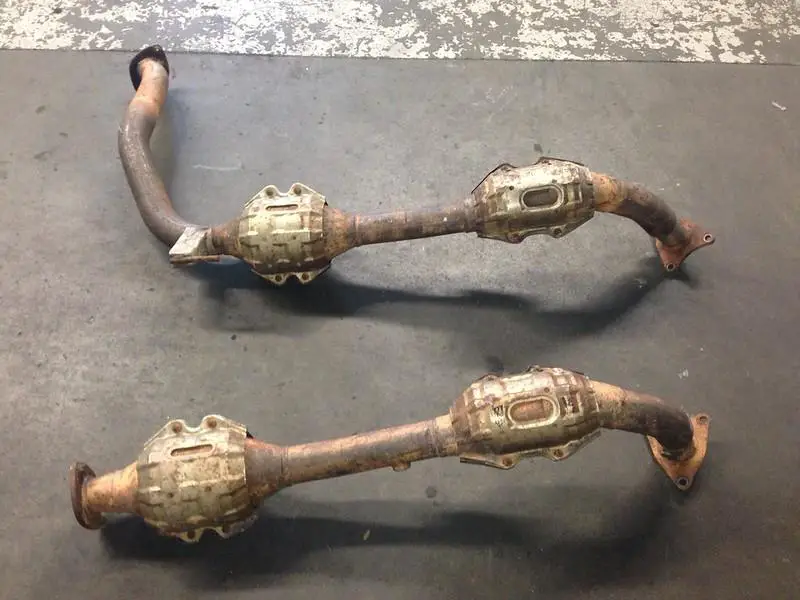When all other possibilities had been checked, the mysterious code P0171 persisted. But could a faulty catalytic converter be to blame? Fortunately, your worries can rest easy on this one – an issue with the catalytic converter won’t cause such a diagnostic code.
When you receive a P0171 error code, this may be the result of an issue within your car’s combustion system – suggesting it is running too rich in oxygen mixture. The cause could possibly point to troubles with vacuum lines or other parts affecting airflow into cylinders.
If you encounter the pesky error code P0171, your mechanic may suggest a costly catalytic converter replacement to rectify it. But don’t start booking that procedure just yet! Read our article for helpful advice and insight on avoiding this expensive fix if possible.
What is a P0171 Code?
A P0171 code is a trouble code that is stored in the onboard diagnostics system of a vehicle. This code indicates that the engine is running lean, meaning that the air-fuel ratio is too high and there is not enough fuel being delivered to the engine. This code can be caused by a variety of issues, from a vacuum leak to a faulty fuel pressure regulator or mass airflow sensor. When this code is present, it is important to perform a comprehensive diagnostic inspection to identify and address the underlying cause of the code.
In some cases, the repair may be as simple as replacing a vacuum hose or tightening a loose connection; however, more complex repairs may be necessary to properly restore the vehicle to normal operation.
Can A Bad Catalytic Converter Cause A P0171 Code?

While the O2 sensor 1 and Cat-only Sensor can provide insight into failing catalytic converters, it is important to note that a bad converter does not indicate trouble code P0171. Rather, an ignition or air/fuel mixture issue may be present instead. If there appears to be a complete blockage in your catalyst system resulting in no flow at all – then you could potentially face a Diagnostic Trouble Code (DTC) such as P0420 when attempting to diagnose any underlying issues.
Exceptions – Where A Bad Cat May Cause P0171 Code
Despite initial research and experiments suggesting that a bad catalytic converter is not responsible for Diagnostic Trouble Code (DTC) P0171, there are exceptions. Different experts have had varying opinions on this matter; hence it’s important to check other potential causes before resolving the issue.
- If you’re driving a vehicle with a damaged catalytic converter, your engine is at risk of being overburdened. This damage can cause toxic sludge to accumulate in the exhaust system and cooling core, creating issues that may lead to unsatisfactory engine performance. Avoid further problems by getting this issue checked out ASAP.
- If excessive back pressure due to a clogged catalytic converter is not addressed, it can trick the oxygen sensor into overcompensating by increasing fuel levels. If spark plugs are displaying slight hints of white after combustion, it may be an indication that there’s either too much air or insufficient fuel being used in the exhaust process.
Most Common Cause Of P0171
- Vacuum leaks
- Weak fuel pump
- Clogged or dirty fuel injectors
- Low fuel pressure
- Clogged or damaged MAF (Mass Air Flow sensor)
- Faulty PCV valve
- Improperly installed aftermarket intake
- Stuck open purge valve/solenoid
- Faulty oxygen sensor
Symptoms Of P0171 Code
- Lack of power from the engine
- Check Engine Light is on or blinking
- Rough idle
- The engine may stumble or misfire
- White spark plug tips
How to Diagnose P0171 Error Code
Suspecting a too-lean system but not sure what to do? Diagnosing the code P0171 can help you get back on track. Real-time scanning with a scanner makes it easy – simply enable constant monitoring of your vehicle’s make and model for any potential issues or codes that may arise. If no scanner is available, research common reasons why problems occur in order to diagnose the issue efficiently and effectively.
- By running a diagnostic test on your engine, you can easily pinpoint the source of a P0171 code. A steady hissing sound heard only when the car off reveals that it’s likely caused by a faulty fuel pressure sensor.
- To help identify the source of your vehicle’s issues, checking both the fuel pressure sensor and mass air flow sensor with a specialized gauge is recommended.
- To ensure the engine runs smoothly, its vacuum and fuel pressure must be maintained within manufacturer specifications. A series of tests are being conducted to identify what caused this error code – if nothing is found it may indicate a faulty sensor is at fault.
- To accurately identify the source of any potential issues, a series of tests must be conducted on key components such as the mass airflow sensor, oxygen sensors, and powertrain control module – all in accordance with manufacturer guidelines.
What Repairs Can Fix The P0171 Code?
- Inspection and replacement of damaged vacuum lines, hoses, vacuum check valves, vacuum-operated actuators, PCV valves, and oil filler caps on some applications.
- Replacement or repair of parts, or all of the inlet ducting.
- Inspection and replacement of inlet manifold gaskets and or seals or inlet manifold gaskets found in the MAF sensor circuit.
Conclusion
a P0171 code can be caused by a variety of issues, ranging from a vacuum leak to a clogged fuel injector. Before beginning any repair work, it is important to properly diagnose the issue. If the code is caused by a faulty catalytic converter, it is important to replace it with a quality, OEM part to ensure the best performance and fuel efficiency. Taking the time to properly diagnose and repair the issue can save you time and money in the long run.
More resources:

